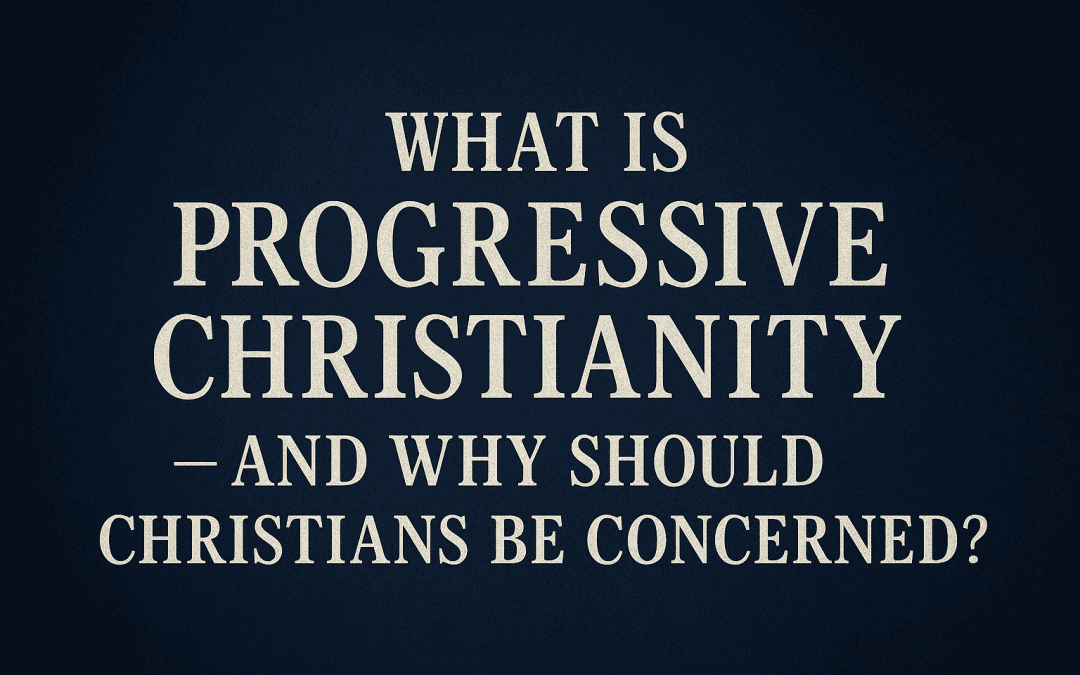In recent years, a growing movement called progressive Christianity has gained traction in churches, books, podcasts, and social media spaces. On the surface, it might sound like a fresh way to follow Jesus in today’s world, but under the surface, it often teaches something very different from historic, biblical Christianity.
As believers who want to follow Christ faithfully, it’s important we understand progressive Christianity, how it contrasts with biblical faith, and why it presents spiritual dangers we cannot ignore. Let’s break this down carefully and biblically.
What Is Progressive Christianity?
Progressive Christianity isn’t one unified group or denomination. Instead, it’s a set of beliefs and tendencies that generally emphasize:
✅ A redefinition of key doctrines such as the authority of Scripture, the nature of sin, the meaning of the cross, and even the identity of Jesus Himself.
✅ A focus on social justice issues often elevates cultural and political causes (like environmentalism, LGBTQ+ affirmation, and gender issues) as central to Christian faith.
✅ A questioning or rejection of biblical authority, treating the Bible not as God’s inspired Word but as a collection of human reflections, prone to error and needing reinterpretation in light of modern values.
✅ A relativistic approach to truth, claiming that spiritual truth is personal and flexible, rather than objective and revealed by God.
In short, progressive Christianity often emphasizes feelings, personal experience, and cultural relevance over God’s revealed truth in Scripture.
Some common progressive teachings include:
- Denial of the Bible’s inerrancy (meaning, they believe the Bible contains mistakes).
- Rejection of the exclusivity of Christ (John 14:6), saying Jesus is a way, not the way.
- Redefining sin, often seeing it mainly as social injustice rather than rebellion against God.
- Questioning or discarding the idea of substitutionary atonement (that Jesus died in our place to pay for our sins).
- Affirming same-sex relationships and transgender identities as compatible with Christian faith.
How Does This Contrast with Biblical Orthodoxy?
For nearly two thousand years, Christians have stood on the unchanging truths of Scripture and summarized them in historic creeds, like the Apostles’ Creed and the Nicene Creed. These creeds affirm:
- The authority of Scripture (2 Timothy 3:16-17)
- The Trinity — Father, Son, and Holy Spirit
- The full divinity and humanity of Jesus
- The reality of sin and the need for salvation through Christ alone
- The bodily resurrection and the life to come
Biblical Christianity holds that God has spoken clearly in His Word, and we are called to submit to it, not revise it.
Jesus Himself said, “Sanctify them in the truth; Your word is truth” (John 17:17, NASB). Paul reminds us, “I am not ashamed of the gospel, for it is the power of God for salvation to everyone who believes” (Romans 1:16, NASB). And Jude urges believers to “contend earnestly for the faith that was once for all handed down to the saints” (Jude 3, NASB).
The progressive tendency to reinterpret or dismiss these truths places it at odds with the faith handed down from the apostles.
Why Should Christians Be Concerned?
Progressive Christianity is not just a harmless shift in style or emphasis — it presents serious spiritual dangers because it:
✅ Undermines the authority of God’s Word.
If Scripture is just a human book, not God-breathed, then we have no firm foundation for truth, morality, or salvation. Paul warned, “For the time will come when they will not tolerate sound doctrine, but wanting to have their ears tickled, they will accumulate for themselves teachers in accordance with their own desires, and they will turn their ears away from the truth and will turn aside to myths” (2 Timothy 4:3-4, NASB).
✅ Redefines the gospel.
The Bible tells us that we are saved by grace through faith in Christ, “who gave Himself as a ransom for all” (1 Timothy 2:6, NASB). Progressive teaching often replaces this with a message of self-improvement, activism, or universalism, leaving people without the true hope of salvation.
✅ Leads people away from repentance.
Instead of calling sinners to repentance (Acts 3:19), progressive Christianity often affirms people in their sin, suggesting they do not need to change. But Jesus said, “Repent, for the kingdom of heaven is at hand” (Matthew 4:17, NASB).
✅ Dulls the church’s witness.
When Christians blend in with the world, they lose the distinctiveness of the gospel. Jesus calls His followers to be “the salt of the earth” and “the light of the world” (Matthew 5:13-14, NASB).
A Call Back to God’s Word
The rise of progressive Christianity is a wake-up call for the church. We must remember:
- God’s Word is our final authority, not culture, feelings, or personal opinions.
- The gospel is unchanging, Jesus alone saves, and we must proclaim Him faithfully.
- True love speaks the truth. We are called to love others enough to tell them the truth, even when it’s hard.
Paul urged Timothy, “Preach the word; be ready in season and out of season; correct, rebuke, and encourage, with great patience and instruction” (2 Timothy 4:2, NASB).
Let’s be people who hold fast to the faith once for all delivered to the saints, who stand on the solid rock of Scripture, and who point others lovingly and boldly to the truth of Christ.
Final Encouragement
If you’re struggling with these issues in your own church, family, or friendships, take heart. God’s Word has not changed, and His promises still stand. Stay rooted in Scripture, pray for discernment, and trust that God will strengthen you to stand firm.
Let’s be Christians who are not swept away by every cultural trend but who hold tightly to the truth, for the glory of God and the good of His people.

